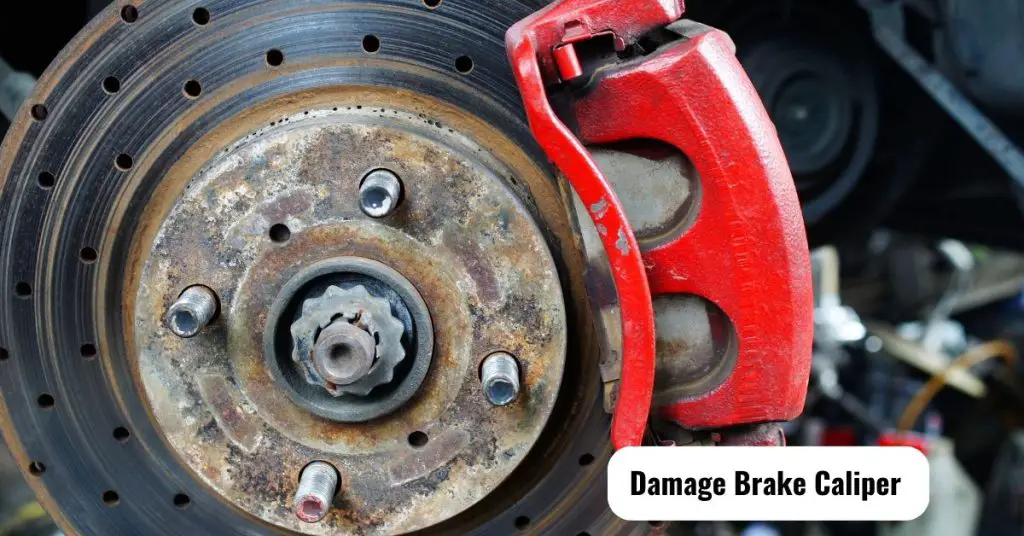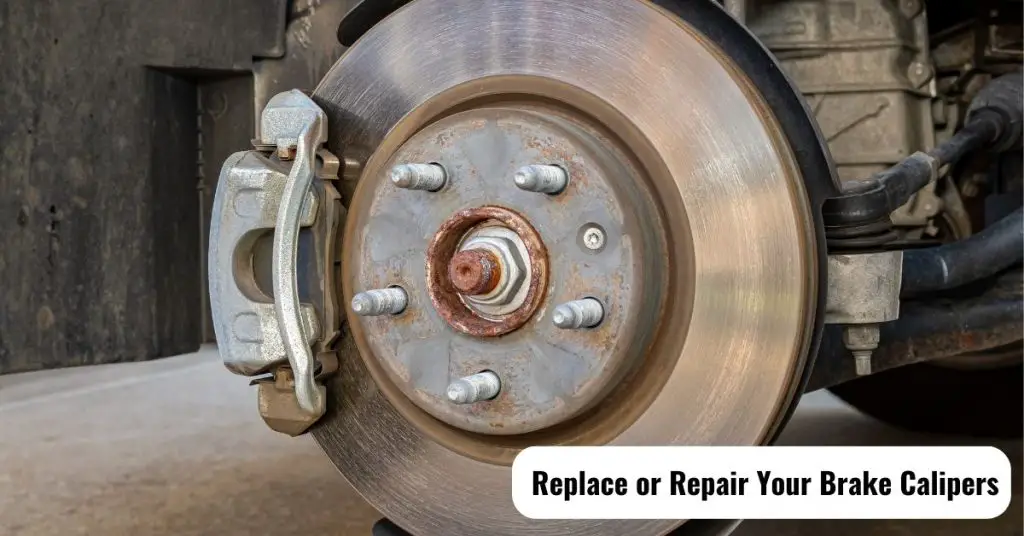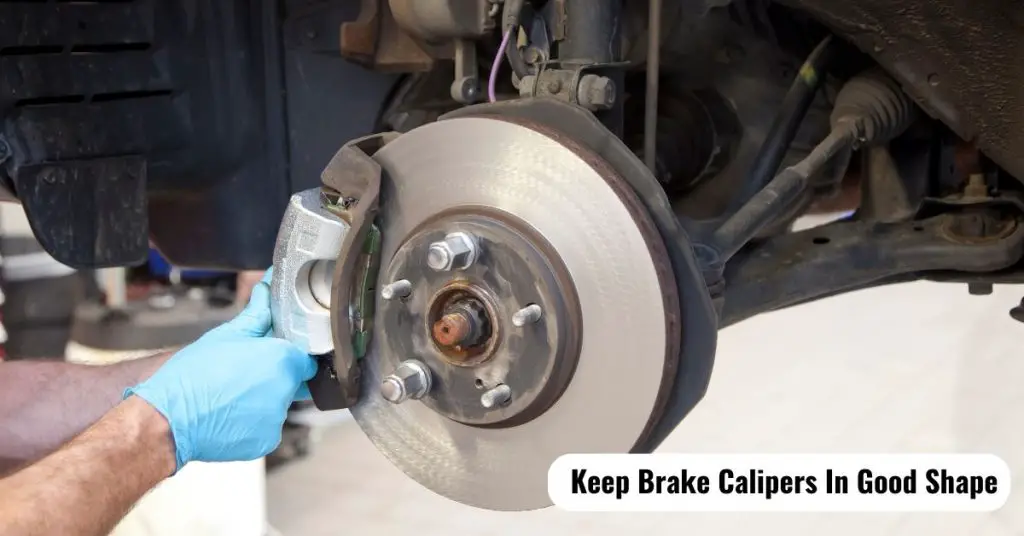Brake Caliper Repair and Replacement: When & How & Tips
Are you experiencing difficulty with your car’s brakes? Does it seem like your vehicle isn’t stopping as well as it used to? One important component of your car’s braking system is the brake caliper. Continuing driving can be extremely dangerous if it’s damaged or worn out.
Brake calipers can wear down over time and need to be repaired or replaced to ensure the safety of your vehicle. Knowing when and how to do this can be crucial for your vehicle’s performance. If you notice any issues with your brakes such as a soft or spongy brake pedal or uneven braking, it may be time to have your brake calipers inspected. Replacement is typically recommended every 50,000 to 70,000 miles. When replacing them, make sure to use quality parts and follow proper installation procedures. As a tip, regular maintenance and inspection of your brakes can help prevent major issues and ensure the overall safety of your vehicle.
A professional mechanic must inspect your brake calipers if you notice any car braking issues. This article will discuss everything you need to know about brake caliper repair and replacement, including warning signs that your calipers may need attention.
Table of Contents
How Do I Know I Damage Brake Caliper?

1. Wired Noises When Braking
The brake system on a vehicle is one of the most important components for safely operating a car. It should be inspected with urgency when there is an issue with it, such as unusual noises coming from the wheels while depressing the brake pedal.
Such sounds may indicate that the brake calipers are stuck – pistons jammed within the brake cylinder bores – reducing braking action and threatening to send your vehicle out of control. These squealing noises could also mean that the brake pad has worn down to its backing plate, which can lead to increased friction and further problems.
2. Brake Calipers Leaking
When you’re driving, the performance of your brakes relies on the proper functioning of a brake caliper and its components. This is why leaking brake calipers can be so dangerous; they cause a decrease in brake fluid, thereby reducing the braking force generated by the caliper piston. In other words, you won’t have enough stopping power from your brake system when needed.
3. Vibrations or Dragging Sensations While Braking
One of the most common issues with brake calipers is when they are sticking, which can cause your car to vibrate or pull to one side while braking. This happens when the caliper pistons become stuck, preventing them from moving freely and providing an even braking force across all four wheels.
In this case, the brake system will be unable to provide a smooth and efficient braking performance, resulting in a dragging sensation or vibration throughout the vehicle.
4. Uneven Wear on Your Brake Pads
If you notice that one side of your brake pads is wearing down faster than the other, this could indicate an issue with your caliper.
One of the pistons may be stuck, preventing the caliper from making full contact with the pad. This will cause one side to wear down faster and unevenly compared to the other, resulting in premature brake pad replacement.
5. Your Brake Pedal Feels Soft
A soft brake pedal can signal trouble in your car’s braking system. When the brake pedal feels spongy, it may indicate that air has entered the system and is compromising pressure within the brake lines.
As air compresses more easily than fluid, less pressure is available to transfer power when it enters the brake line and subsequently causes braking action. In short, if your brake pedal doesn’t feel solid, it indicates that pressure is not adequately transferred throughout the braking process.
How To Replace Your Brake Calipers?
1. Determine which brake caliper needs replacement or repair
To determine which brake caliper needs attention, inspect the brakes for signs of damage or wear. Check the brake pads for uneven wear and listen for any abnormal noises such as grinding, squealing, or rubbing sounds. If you feel a soft or spongy sensation when pressing the brake pedal, it is likely that the caliper requires repair or replacement. You may also notice a decrease in your vehicle’s stopping power, which can be attributed to a worn-out caliper.
2. Gather the necessary tools and materials
Once you have determined which caliper needs attention, gather all the necessary tools and components required for either repair or replacement. To replace or repair the calipers, you will need a variety of tools, including a socket set, wrenches, pliers, and a brake-specific lubricant. You will also need new brake calipers and brake pads if you are doing a replacement.
3. Remove the old brake caliper
Begin the process by lifting the vehicle and locating the brake caliper. Use a socket and ratchet set to unbolt the caliper from its mount, then remove it carefully. Once removed, inspect the caliper for any obvious damage such as corrosion or leaking fluid. If there is evidence of wear, it may be necessary to replace the entire caliper.
4. Install the new brake caliper
Attach the new brake caliper to the rotor, using brake-specific lubricant on the contact points. Be sure to properly lubricate the caliper bolts and mount before installing the new brake caliper. Use a torque wrench to ensure that all bolts are tightened correctly, as over-tightening can cause damage to the caliper. Once installed, reinstall the brake pads, fill with fresh brake fluid, and bleed any air from the system.
5. Install new brake pads
If you are doing a replacement, now is the time to install new brake pads. Once the caliper is securely attached to the rotor, install any new brake pads. To do this, make sure all components are properly lubricated and replace the worn-out brake pads with new ones. Ensure that the brakes are properly lubricated and filled with brake fluid before attempting to bleed any air from the system.
6. Bleed the brakes
Bleeding the brakes is an essential step for removing any air bubbles in the brake lines. Start by loosening the bleeder valve on the caliper and attaching a hose to the valve. Then, slowly pump the brake pedal until you see clear brake fluid coming out of the hose.
When to Replace or Repair Your Brake Calipers?

Brake calipers are essential braking components that clamp the brake pads onto the rotors to slow or stop a car. As such, properly working brake calipers are crucial for safe driving. However, over time, brake calipers may wear out, lose their hydraulic pressure and become prone to failure. So, how do you know when to replace or repair your brake calipers? In this article, we will outline the key signs that indicate a faulty brake caliper, when to repair or replace it, along with some helpful maintenance tips to keep your brake calipers in good condition.
There are several signs that indicate a faulty brake caliper. The first sign is uneven brake pad wear, caused by the caliper not moving evenly. Another sign is a soft or low brake pedal, which results from a leaking caliper or problems with the hydraulic system. If you hear a rubbing or grinding noise coming from the brakes, it could indicate the caliper is not releasing correctly, leading to continuous friction on the rotor. A stuck caliper can also cause vibration or pulling to one side while braking.
If you experience any of these signs, it is time to inspect the brake calipers. A professional mechanic can diagnose the brake caliper issue and advise whether to replace or repair them. In most cases, a worn-out or damaged brake caliper requires replacement. However, minor leaks or damages to caliper components can get fixed by using a brake caliper repair kit. Regular maintenance can also prolong the lifespan of your brake calipers, such as bleeding the brakes, checking the brake fluid levels, and replacing the brake pads and rotors per the manufacturer’s recommendations.
Why does the Brake Caliper Get Damage?
No matter what type of vehicle you drive, quality brakes are essential for your safety and security on the road. And it’s the brake calipers that play a crucial role in your vehicular brake system. Unfortunately, over time, these components can get damaged from prolonged and improper use.
When you apply pressure to your brakes, friction is generated between the brake disc and brake pads, transferring kinetic energy into thermal energy. As you continue to strain your brakes over several moments, this exertion results in an intense rise in temperature inside the brake calipers. Similarly, when you release the brakes, the calipers cool down abruptly.
Over time, this heat-up and cool-down pattern may begin to corrode both the internal and external surfaces of your brake calipers. The corrosion can cause a rough texture, creating loud noises during use and reducing your car’s overall efficiency with braking power.
To avoid long-term damage caused by dirty or worn-out brake parts, it is important to have regular maintenance checks done on your car to ensure everything is in proper working condition.
How Can I Keep My Brake Calipers in Good Shape?

Maintaining your brake calipers is essential to keeping your car in good condition and safe. Brake calipers apply pressure to the brake pads, causing friction that stops your vehicle. If they become damaged or worn down, it can cause dangerous braking problems and increase the risk of an accident.
Fortunately, there are some simple steps you can take to
1. Check the calipers regularly for signs of wear and tear. This includes inspecting the seals, slides, and pistons for any damage or signs of leaking.
2. Keep them clean, free from dirt, dust, or debris, and grease the slides if necessary.
3. Ensure that your brake pads are in good condition; replace them when needed to ensure your car’s safety.
4. Have a professional check your brakes every 10-12 thousand miles or so to ensure they function properly.
5. If you notice anything unusual while braking, have it checked by a qualified mechanic immediately to prevent further damage to your car’s braking system.
Tips for Brake Caliper Replacement/Repair:
Before embarking on the replacement or repair, ensure that you have all the necessary tools and equipment required. Safety is essential, so make sure you have a stable base to work on and avoid working alone. Additionally, take note of the brake fluid level and make sure you have enough on hand. Be careful when handling the brake fluid, as it is corrosive. Finally, use a torque wrench to tighten the bolts and avoid over-tightening, which can cause damage to the caliper.
Frequently Asked Questions [FAQs]
1. Can The Brake Caliper Be Repaired?
Yes, it is possible to repair brake calipers. Depending on the issue, several different repairs may be necessary. Some of the most common repairs include replacing worn or broken seals, replacing damaged pistons, and repairing or replacing any other components that are no longer functioning properly. If a brake caliper is beyond repair or the repair cost exceeds the part’s value, then a replacement caliper may be necessary.
2. How Long Does It Take To Replace Brake Calipers?
The time it takes to replace brake calipers depends on your vehicle type and the complexity of the repair needed. Generally, replacing a single brake caliper can take 1-3 hours, while replacing both can take up to 5 hours.
3. Why Replace Brake Calipers?
Replacing brake calipers is an important part of maintaining your vehicle’s overall performance and safety. Brake calipers allow your brakes to work properly by controlling the amount of pressure used when applying the brakes. Over time, brake calipers can become worn or damaged due to wear and tear, age, or exposure to road debris and salt. Additionally, if a brake caliper leaks fluid or makes noise, it should be replaced as soon as possible.
4. How Long Do Calipers Last?
It is recommended to replace brake calipers every 100,000 miles or after ten years due to their durability. Regular vehicle inspections ensure the proper functioning of all braking system components.
5. What Are The Benefits Of Replacing Your Brake Calipers?
Replacing your brake calipers can provide several benefits. Most importantly, new calipers will restore the integrity and safety of your car’s braking system. In addition, replacing worn or damaged brakes will help to improve your car’s overall performance by providing better stopping power and quicker response time when braking.
Conclusion
The brake calipers are a crucial component of your car’s braking system. They play a vital role in slowing your car down and keeping you safe on the road. So, if you notice any signs of wear or damage, don’t ignore them! It’s important to get them repaired or replaced as soon as possible. Whether you choose to tackle the repair yourself or go to a professional, remember to follow the correct procedures and use quality parts. And always prioritize safety when working on your car. Maintaining your brake calipers may seem like a small task, but it plays a big part in keeping you and your passengers safe on the road.
